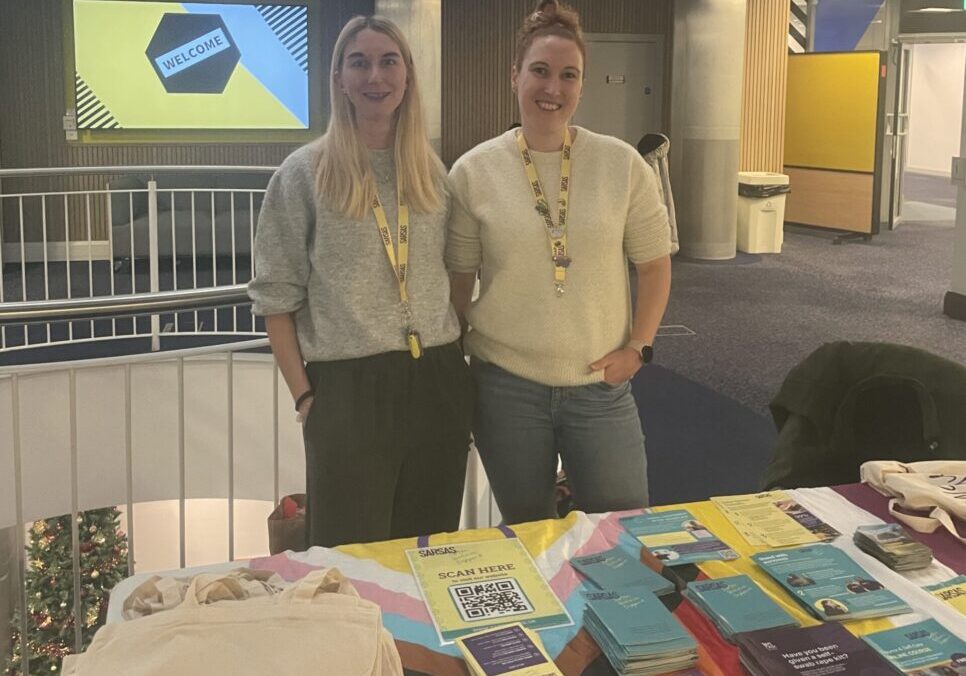
Campaign to include protections for women & girls in the Online Safety Act 2023 (Part 1)
Online violence against women and girls is a striking issue in the UK, with many people largely unaware of the abuse perpetrated online.
In the first of three blogs looking at the impact of the Act, SARSAS comms volunteer, Toby, starts by giving an overview of the Act and how an amendment to include protections for women and girls came to be added.
The End Violence Against Women (EVAW) coalition is a group of 155 feminist organisations and experts from across the UK, including SARSAS, working to end violence against women and girls. They summarise the scale of the problem:1
“One in three UK women have experienced online abuse or harassment on social media or another online platform, rising to 62% of young women. Of these 1 in 3 women, 1 in 6 experienced this abuse from a partner or ex-partner. Data from 2017-2021 shows that 4 in 5 victims of online grooming offences are girls.”
The start of the Online Safety Bill
The first version of the Online Safety Bill was announced in 2017. The drafters of the Bill aimed to make the UK the ‘safest place to be online’ in the world2. With areas of anti-terrorism, child protection and stronger safety processes for service users considered and covered in the initial versions of the Bill.
However, there were no discussions of extending this protection to women and girls. As the Bill progressed through parliament, concerns grew over this omission, and questions were raised as to how the Act could make the UK the ‘safest place to be online’ without offering stronger online protection for women and girls. EVAW decided to campaign for change3.
End Violence Against Women coalition’s campaign
A petition was created on 29 November 20214 to protect women and girls from online abuse. EVAW, Glitch, Refuge, Carnegie UK, NSPCC, 5Rights, the Suzy Lamplugh Trust, and many more charities, organisations, and individuals within the coalition worked to grow awareness for the campaign.
The petition received over 100,000 signatures in total, which meant that the petition had to be read out in parliament and debated by MPs. Alex Davies-Jones MP, Caroline Nokes MP, and Baroness Nicky Morgan led efforts to gather cross-party support for the amendment in parliament.
The campaign was successful, and on 30 June 2023, an amendment to the Online Safety Bill was published by the Department of Science, Innovation and Technology. The Online Safety Act 2023 (The Act) was passed in September of the same year, meaning protection against online abuse for women and girls was not part of the discussion during the Bill’s parliamentary approval process.
Despite this, the Act was expanded and introduced new criminal offences for5:
(*4 new offences are being added to section 66B of the Sexual Offences Act 2003 covering the sharing of intimate videos or photographs without the consent from all the concerned parties.)
As well as this, social media platforms are required to remove illegal content, including intimate image abuse, stalking, or harassing content online. Online reporting systems will have to be more accessible, responsive, and effective in resolving user complaints relating to illegal and/or harmful content.
What does this mean for the Act?
It was announced that OFCOM (the regulatory body making sure regulated services take appropriate steps to protect their users) would consult the Domestic Abuse Commissioner and Victims Commissioner before producing the guidance for protecting women and girls under the Act. This is a welcome attempt to ensure the Act reflects the voices of victim-survivors of online abuse as well as experts in the field, although many argue this does not go far enough to ensure women and girls are adequately protected6.
OFCOM has published draft codes of practice for protecting children and tackling fraud and terrorism, central issues that were part of the Act from its inception. Due to the late addition of online violence against women and girls in the Act, the guidance published alongside the new legislation does not include a code of practice for service providers to follow.
EVAW, the coalition of charities and organisations that campaigned to include women and girls, have written their own draft7. It was announced that OFCOM (the regulatory body making sure regulated services take appropriate steps to protect their users) would consult the Domestic Abuse Commissioner and Victims Commissioner before producing the guidance for protecting women and girls under the Act. This is a welcome attempt to ensure the Act reflects the voices of victim-survivors of online abuse as well as experts in the field, although many argue this does not go far enough to ensure women and girls are adequately protected and whilst OFCOM have committed to publish guidance for tech companies about protecting women and girls, to date a robust, enforceable code of practice does not exist.
How will this affect people in the UK?
How the Online Safety Act will be applied under the UK criminal justice system in the coming years remains to be seen, as does OFCOM’s development of guidance documents and the codes of practice relating to the governance of online violence against women and girls. What we do know is that the first perpetrator of online abuse has been convicted of an offence newly brought in under the Act8. They could now face prosecution and could find themselves on the Sex Offenders Register, as well as fined or imprisoned for up to two years.
This conviction would not have been possible without the efforts of EVAW, Glitch, Refuge and all the other organisations and individuals across the UK fighting to eradicate violence against women and girls – and all the people who took the time to sign the petition and lent their voices to the campaign to protect women and girls from online harm.
Toby Howells is a volunteer communications officer with SARSAS. Toby graduated from the University of York’s Law School in 2020, studying public and criminal law and now works for Bristol City Council.
Legal disclaimer: This article contains general legal information; the legal information is not advice or guidance and should not be treated as such. The information on this website is provided without any representations or warranties and is published exclusively to provide opinion and awareness.
The SARSAS newsletter
Sign up to our monthly newsletter for all the latest news, jobs, blogs, events and campaign updates.
- https://www.endviolenceagainstwomen.org.uk/coalition-experts-code-of-practice-online-violence-against-women-girls/ ↩︎
- https://www.gov.uk/government/news/uk-children-and-adults-to-be-safer-online-as-world-leading-bill-becomes-law ↩︎
- https://www.endviolenceagainstwomen.org.uk/coalition-of-experts-call-for-a-vawg-code-of-practice-in-the-online-safety-bill/ ↩︎
- https://www.change.org/p/michelledonelan-the-uk-s-new-online-safety-law-must-protect-women-girls-from-online-abuse ↩︎
- https://www.brettwilson.co.uk/blog/the-online-safety-act-2023-nine-new-criminal-offences-come-into-force/#:~:text=On%2031%20January%202024%2C%20Part,response%20to%20emerging%20behaviours%20online.&text=Section%20179%20creates%20a%20criminal%20offence%20of%20sending%20false%20communications ↩︎
- https://www.endviolenceagainstwomen.org.uk/coalition-of-experts-call-for-a-vawg-code-of-practice-in-the-online-safety-bill/ ↩︎
- https://www.endviolenceagainstwomen.org.uk/wp-content/uploads/2022/05/VAWG-Code-of-Practice-16.05.22-Final.pdf ↩︎
- https://www.theguardian.com/uk-news/2024/feb/12/first-person-in-england-and-wales-convicted-of-cyberflashing#:~:text=Nicholas%20Hawkes%2C%20from%20Basildon%20in,Essex%20police%20the%20same%20day ↩︎





